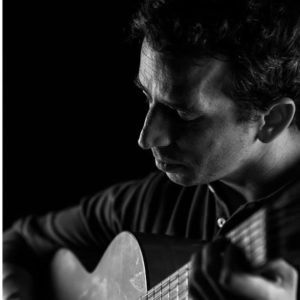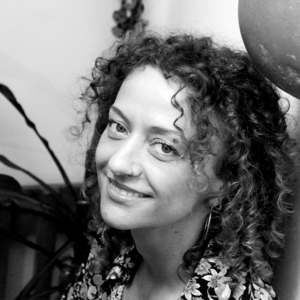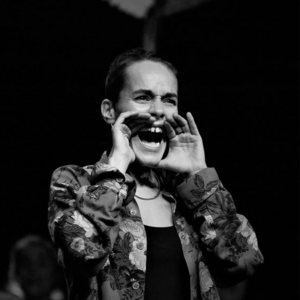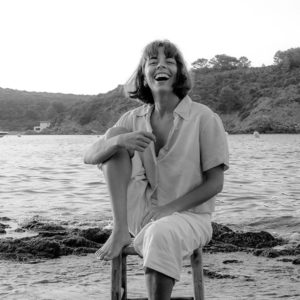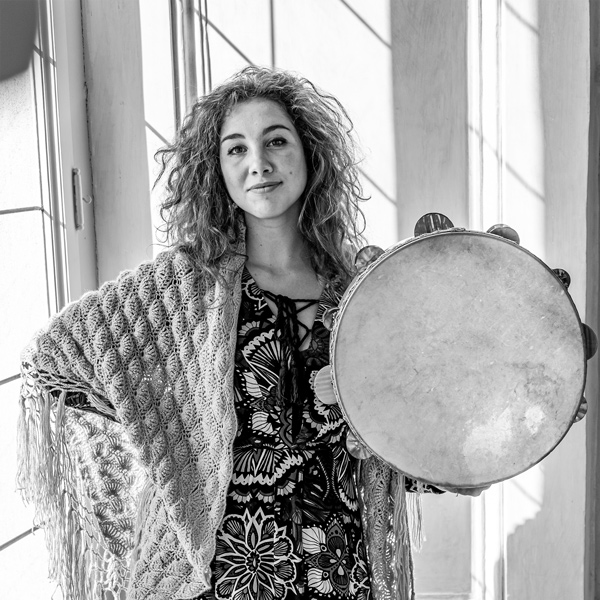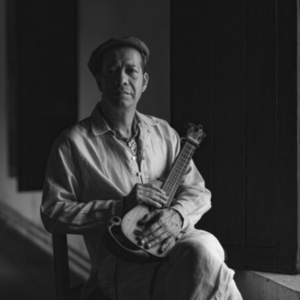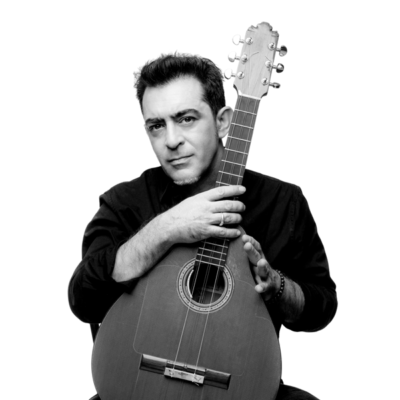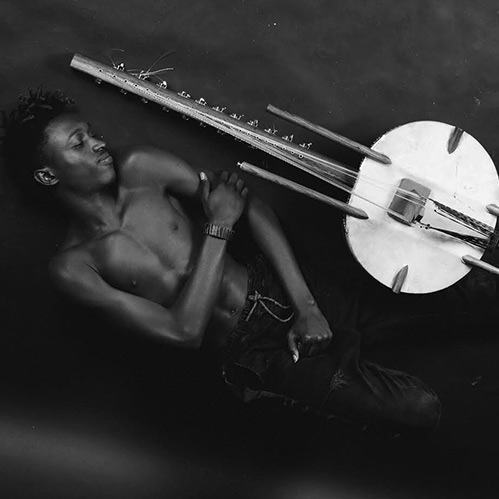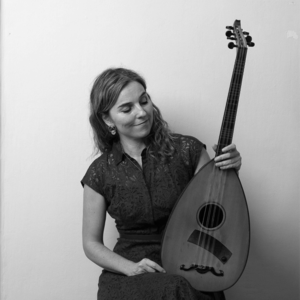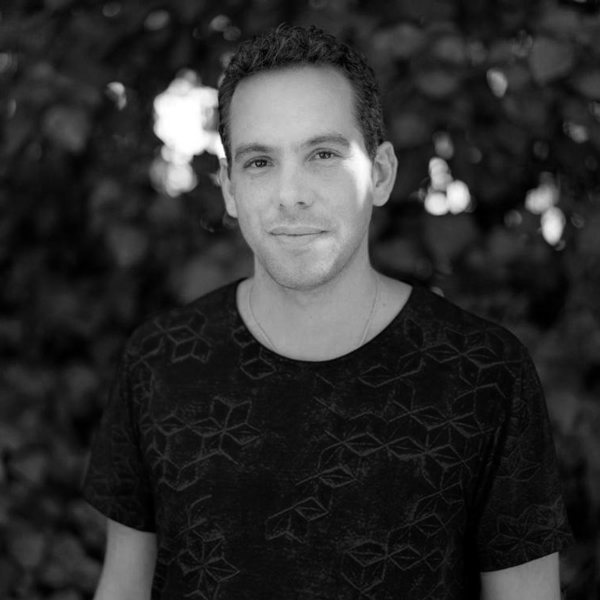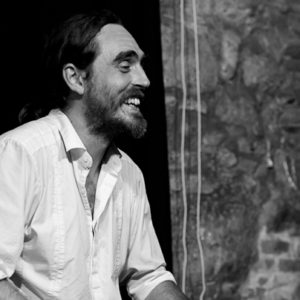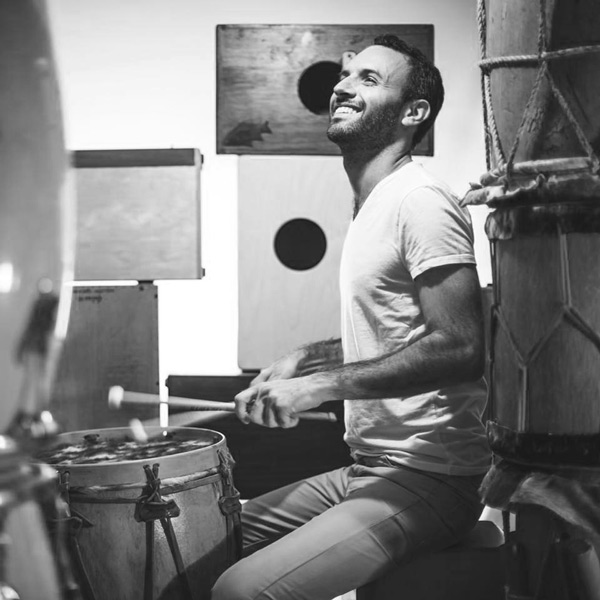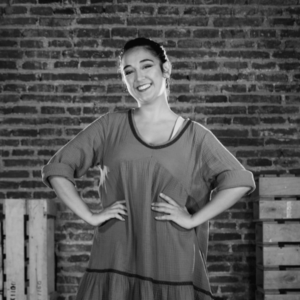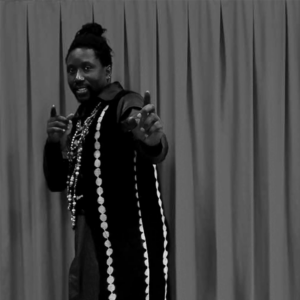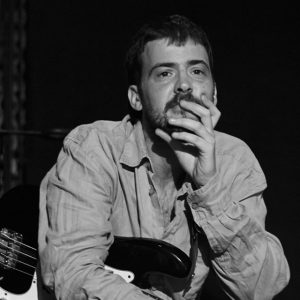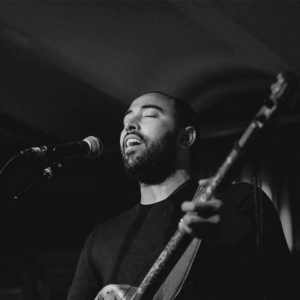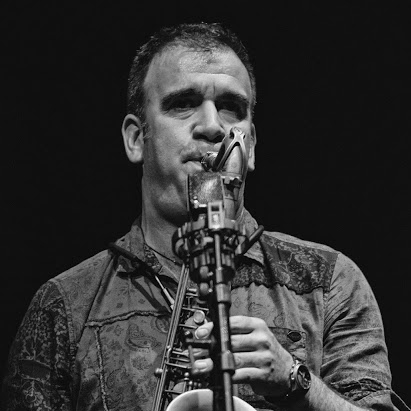Juan Quintero
Argentinian musician, singer, guitarist and composer, a reference in Argentina’s singer songwriter scene, was born and raised in Tucumán, in a family of musicians. At the age of 14, he began to study guitar and trained as an autodidact, participating in singers’ meetings, clubs and other cultural events. He studied choral conducting at the Faculty of Fine Arts of the National University of La Plata and is a professor of Audioperception and Solfeggio.
In mid-1999 he formed the Aca Seca Trio together with pianist Andrés Beeuwsaert (from Olavarría) and percussionist Mariano Cantero (from Santa Fe). Their repertoire is composed mainly of songs by Quintero.
He has shared the stage with Luna Monti, Mercedes Sosa, Juan Falú, Pepe Núñez Raúl Carnota, Jorge Fandermole, Carlos Aguirre, Liliana Herrero, Luis María Pescetti, Edgardo Cardozo and Coetus, among others. His compositions have been recorded and performed in concerts by artists such as Carlos Aguirre, Orquesta El Arranque, Lorena Astudillo, Pedro Aznar, Juan Falú, Jorge Fandermole and Silvia Iriondo.
Luna Monti
Davide Salvado
Davide Salvado is undoubtedly one of the most charismatic voices in Galicia. Self-taught, he has spent half a life touring the villages of his country in search of rhythms, verses and dances. From the women he met, he learned not only the tradition of music, but also a way of life.
He has collaborated on various recordings, including “Galiza” by Kepa Junkera or “Sing me Home” by the Yo-Yo Ma Silk Road Ensemble, and has released two solo albums: “Árica pura” (2011) and “LOBOS” (2015), enthusiastically received by the public and critics, winning the award for best traditional production at the 2017 MARTÍN CÓDAX music awards.
Since 2019 he presents his new show “AMARELO” featuring traditional songs from Galicia and other parts of the world, reinterpreted from the contemporary perspective that characterizes Davide and accompanied by texts by the writer, screenwriter and actor Manolo Cortés.
Teresa Melo
Teresa Campos sings, composes, and directs creative musical projects. With a degree in Education and a special interest in Education through Art, she completed a Master’s in Music at the Guildhall School of Music & Drama (London). She is interested in the power of traditional music as a social and creative tool and is involved in collective musical education and creation mainly in Portugal and France. She has been the artistic leader of Ethno Portugal since 2014 and in 2021 she created the Popular Music Choir in Porto. In 2022, she co-created two shows: “Castōr e Pollūx – lilia considerada,” commissioned by the Teatro Municipal do Porto, and a creative duo with Inês Campos, and “Trois voix, quatre saisons,” a project of Jeunesse Musical de France created as a trio with Nils Peschanki and Darragh Quinn (2022). As a composer, she collaborates with Nenad Kovačić in creating soundtracks for Croatian plays and documentaries such as “Mileva” or “Nora oder Wie man dones Herrenhaus kompostiert” by Jelena Kovačić (2021 and 2024), “Love around the world” by Anđela and Davor Rostuhar (2021), and “Dobra Ekonomija” by Đuro Gavran (2022). She has collaborated as an interpreter on more than two dozen albums by artists she truly likes, including Sara Vidal, Retimbrar, Marcos Cavaleiro, Daniel Crist, A Presença das Formigas, Torcido, Zelig, Júlio Pereira, Amélia Mugeix, Mondryaan (London), Perotá Chingó, and Duo A/R (Argentina), and is part of Collado, a project with eight musicians focusing on Iberian traditional music. She is a co-founder of Sopa de Pedra, a vocal group of ten women dedicated to collecting, rearranging, and singing Portuguese a cappella music with strong traditional roots, and Çhâñt élečtrónïqùe, an international collective of seven musicians from Portugal, Croatia, Bosnia and Herzegovina, France, and Ireland, with a desire to explore the potential of traditional music with electronics. She is fortunate to be able to do what she loves.
Anna Ferrer
Anna Ferrer (Menorca 1993) is a singer and songwriter from Menorca who has been involved in music since the age of 3. She has been dedicated professionally to the cultural sector since joining the folk group S’Albaida in 2008, with whom she recorded two albums (Xalandria and Soldemà) and came into contact with references such as Eliseo Parra and Marina Rosell, performing on stages around the world (Fira Mediterrània de Manresa, IX International Folk Contest Cuartu Los Valles in Asturias, Ollinkan Folk Festival in Mexico, among others).
She studied Higher Music Studies specializing in jazz singing at the Taller de Músics in Barcelona, where she was involved in many projects and collaborated with artists from the folk scene and singer-songwriters such as Coetus, Toti Soler, Clara Peya, or Salvador Sobral.
She began her solo career in 2017 with the release of her first album, Tel·lúria, which pays tribute to her beloved island, Menorca. In 2019, she released KRÖNIA, a second work in which she elevates folklore to a more universal sound through electronic sound processing.
In 2020, she co-directed with Paula Grande the album and show VEGA, a work that revises the popular repertoire of Girona through the archive and project of Càntut, focusing on the role of women in the last two centuries through these songs. An exercise in historical memory done through music and based on feminist activism.
“Parenòstic” is the name of her current solo project, which goes beyond purely musical aspects and explores a more performative and scenic facet of the artist. Anna Ferrer continues her research into her own tradition and folklore as starting concepts and opens up to scenic avant-garde. She also tours as a soloist with OMAC (Orquestra de Músiques d’Arrel de Catalunya).
Her latest singles are “Na Roseta” (where she collaborates with Eliseo Parra) and “Al son de las balas” (a commission from Doctors Without Borders), which she produced together with Dani López.
Livia Giaffreda
Singer and percussionist from Puglia, Italy, Livia first approached the world of traditional music through the tamburello, the tambourine of southern Italy. She studied the instrument first as an autodidact and then with renowned teachers such as Michele Piccione, Nando Brusco, Glen Vélez and Andrea Piccioni, her teacher at the Nocera Terinese Conservatory (Calabria).
Her voice being her main instrument, she is dedicated to learning and interpreting the traditional songs of her homeland and many other cultures thanks to the musical projects with which she has collaborated in the last eight years. Her repertoire includes sounds from southern Italy, Spain, Portugal, Greece, the Balkan Peninsula, France, Latin America, Crete and the island of La Reunion. She also performs with the international company Won Myeong Won Company from Sweden and with the Anemone Teatro company from Italy.
Ramón Gutiérrez
Ramón Gutiérrez Hernández was born in Carlos A. Carrillo and raised in Tres Zapotes, Veracruz, Mexico. Surrounded by musicians where Bolero and Son Jarocho were the daily bread. At the age of six, he discovered the beauty of the instrument he currently plays – “La Guitarra de son.” Being Son Jarocho a music transmitted from generation to generation and not existing in written form, he has dedicated the last twenty-five years of his life to transmitting from the old masters, a kind of itinerant music school, compiling the sounds and styles of the traditions within this culture. As a result, he is now the custodian of a musical bridge that connects the older generations of Son Jarocho with the new. For the past two decades, he has taught zapateado, jarana, and requinto at the Neftalí Rodríguez music school (an independent cultural space he founded and directs in Xalapa, Veracruz). Many of the generations that have passed through the school have had the effect of spreading traditional fandango from the countryside to the city and, in the process, from a prosperous scene of Son music…, in which young people and adults participate. Bearing in mind that Son Jarocho music was almost extinct in the 1970s, the efforts of many and of Ramón have contributed to recreating this musical culture by instilling a sense of pride, in a living process in today’s Mexican youth.
Raúl Rodríguez
Musician and Anthropologist. Producer, composer, singer-songwriter, guitarist and creator of the “Tres Flamencos”. Raul Rodriguez, son of the singer Martirio, learned to love music at home, in the setting of the Sevillian counterculture of the ’70s. He started out as a blues and rock electric guitarist and drummer. He trained as a flamenco guitarist studying the Toque de Morón. He graduated in Geography, History and Cultural Anthropology from the University of Seville to better understand the nature of Spanish traditional music. Since 1992 he has been part of groups such as Kiko Veneno, Martirio (his mother), Javier Ruibal, Juan Perro (Santiago Auserón), Caraoscura and Son de la Frontera.
Since 2014, he has published his solo works in book-disc formats, “Razón de Son”, “La Raíz Eléctrica” and “La Razón Eléctrica” (Altafonte, 2014, 2017 and 2023), in which he develops a “Creative AnthropoMusic of back and forth songs” from which he delves into the connections between flamenco music and the cultural fabric of the Afro-Andalusian Caribbean. Throughout his career, he has also recorded and played live with artists such as Chavela Vargas, Compay Segundo, Enrique Morente and Jackson Browne, among others.
Momi Maiga
At the age of 26, Momi Maiga stands out as a virtuoso of his instrument (the kora), a skilled vocalist, and a self-taught composer with remarkable musical sensitivity. In his compositions, he blends ethnic jazz, flamenco, and sparks of European classical music. He mainly sings in Mandinka and Wolof, addressing important contemporary themes through music.
Raised in the Casamance region in southern Senegal, amidst the rich musical heritage of West Africa, Momi Maiga comes from the renowned Cissokho family of musicians and was nurtured in their rich musical traditions. His artistic legacy, following the ancestral heritage of the griots, deeply connects him with the traditions of the Mandé people and their repertoire. At the age of six, he began playing the kora, one of the most revered instruments in the region.
Two decades later, now established in Girona, Maiga has excelled as a singer, versatile instrumentalist, band leader, courageous and talented composer, making a name of himself in Spain, Belgium, and France. In late 2022, Momi released his debut album, “Nio,” with which he has performed over 70 concerts with his quartet, including 30 cities across France, Belgium, the Netherlands, Germany, and Switzerland. In October 2024, he will present his second album, “Kairo,” the title of which means “peace” in Mandinka, his native language.
Momi continues to collaborate with his talented team of musicians, including Catalan percussionist Aleix Tobias, cellist Marçal Ayats, and Mexican violinist Carlos Montfort. These musicians have shared the stage with numerous renowned artists such as Marco Mezquida and Silvia Pérez Cruz, with whom the artist has also collaborated.
Martha Mavroidi
Martha Mavroidi is a singer, lutist and composer from Greece. She has been singing and playing folk lutes from her childhood, performing music from Greece and the Balkans. Later she developed an interest in contemporary music, blending elements of folk music with contemporary harmony and improvisation. She graduated from the Music High School of Pallini, and she has studied Musicology in Athens (University of Athens), Ethnomusicology in London (SOAS) and Los Angeles (UCLA), and Contemporary Music in Amsterdam (Conservatorium Van Amsterdam) with scholarships from the Fulbright Foundation and the Onassis Foundation. She has collaborated with important musicians and ensembles such as the legendary Greek folk violinist Stathis Koukoularis, ECM artist Savina Yannatou, English folk singer and violinist Eliza Carthy, and the Greek National Opera. With her Quartet she has performed in various venues in Europe and the USA. She is a member of the sextet “Smari” and the vocal ensemble “Yasemi”. She conducts the Greek Folk Choir “Rodia” and the “Happy Hour Choir”, a workshop in the form of a vocal orchestra. She has composed music for prize-winning short and feature films, and for dance and theater productions, including “Hello to Emptiness” by German Dance Company Mouvoir with which she has toured in Greece, France, Germany, and Korea. She has been commissioned to compose musical works for the Greek National Opera (“Domna’s Song” for the 2021 bicentennial of the Greek Revolution, “Katalogi” 2022, “Lazarakia” 2023) and the Greek National Theater (“Blood Wedding” by F.G.Lorca 2022). She has released five albums: The Garden of Rila (2009), Portaki (2012), Agiorgitiko (2014), Thread and Needle (2017), Magiatiko (2019) and she has published a book with compositions for vocal ensemble “Thread and Needle” (2019). Since 2013 Martha is the artistic director of Tinos World Music Festival.
Itamar Doari
Itamar Doari is an internationally renowned percussion artist, music producer, and composer. For over 20 years, Doari has been collaborating with a myriad of artists, performing concerts on the world’s most prestigious stages, teaching masterclasses, recording albums, participating in music conferences, and spreading his music and spirit across the globe.
Itamar was born and raised in Galilee, Israel, surrounded by a wealth of coexisting musical traditions and rhythms. Inspired by this artistic environment and infinite musical sources, Doari began studying the ancient art of rhythm and drumming and digging into his cultural roots. His curiosity led him to travel around the world, researching, learning and practicing rhythms around the middle-east, Spain (Andalusia), India, and Senegal.
His unique music identity and technique is born from the merging of the knowledge he gathered during his journeys into far-flung musical traditions with more familiar Middle Eastern instruments such as the ceramic dohola darbuka, a wide variety of frame drums, udu drum, and the cajon, as well as cymbals, bells, and shakers, creating a unique, evolving musical blend. This makes Itamar in the eyes of many one of the world’s most innovative and influential percussionists in the contemporary music scene.
Itamar’s long list of partnerships with renowned artists includes famed jazz musician, Avishai Cohen, mandolinist and Grammy nominee, Avi Avital, the illustrious Ladino singer, Yasmin Levy, as well as Concha Buika, Berry Sakharof, Idan Raichel, Esther Ofarim, Yoni Rechter, Eviatar Banai, Amal Murcus, Ahuva Ozeri, Shye BenTzur, Nitin Sawhney, Omer Faruk, Tekbilek, Ravid Kahalani with Yemen Blues, Radiohead guitarist and composer Johnny Greenwood and more.
Aleix Tobias
Percussionist and drummer attracted by tradition, world music and new sonorities, Aleix Tobias was born in 1976 in Badalona from a non-musical family, but was drawn to the drums from a very young age. He began studying drums at 16 at the Escola de música moderna de Badalona. During this period, he formed Tactequeté, an experimental percussion group. In continuation of his music training, he dedicated himself to traveling and learning world traditional percussion of Senegal, Gambia, Morocco and Brazil, amongst others. He also spent time in Egypt, where he met Misirli Ahmet with whom he then traveled and played extensively throughout Europe and Turkey. At age 23, Aleix’s path crossed that of Eliseo Parra, with whom he began to learn the rhythms and techniques of traditional Iberian percussion. Inspired by the drum ensembles of the countries he visited, he created Coetus, an Iberian percussion orchestra dedicated to the re-creation of traditional music.
Aleix Tobias played with various singers, including Carles Dènia, Eliseo Parra, Silvia Perez Cruz, Aziza Brahim, Jackson Browne, Tal Wilkenfeld, Juan Quintero y Luna Monti, Raul Rodriguez, Maritirio, Carmen Paris, Maria del Mar Bonet, Judit Neddermann, Rusó Sala, La Shica, Mel Seme and more. He also played in concerts and festivals around the world with bands and musicians such as Misirli Ahmet, Erkan Ogur, Doudou N’diaye Rose family, Orquestra de Jazz de Galícia, Carles Benavent trío + Tomasito, Ross Daily, Zohar Fresco, Marco Mezquida trio, Nevil Rhadakrhisna, Roots Revival Romania, Erkan Irmak, Las Migas, Xalupa, Raúl Rodriguez con Razón de Son, Compañia Electrica Dharma, La Fura dels baus, La big band de Miguel Angel Blanco with Jerry Gonzalez, and more. As well as sharing his knowledge of traditional Iberian percussion in Masterclasses in Spain and around the world, his extensive experience in the studio, as well as his musical sensibility, have led him to work on projects as producer.
Marcelo Woloski
Marcelo Woloski is a multiple Grammy and Latin Grammy winning percussionist, producer and composer. His broad array of sounds, versatility, masterful skill, charismatic personality and creativity has made him the to-go person for recording artists, producers and arrangers throughout the globe. As described by Journalist Raul Da Gama “Woloski is a musician and percussion colourist who employs an enormous aural palette to express himself”.
The Berklee College of Music graduated percussionist, based in New York City for 12 years, became a regular member, has recorded multiple albums, and has toured the world with groups like Snarky Puppy, Banda Magda, and the group of Sofía Ribeiro.
Voted “Percussionist of the year 2017” by Bateristica Magazine and “Most creative performer” by Sala Musik Festival 2020, Woloski’s performing and recording credits include Susana Baca, Ruben Blades, Marta Gomez, Laura Mvula, Paquito D’Rivera, Becca Stevens, Lalah Hathaway, Chris Potter, and The Kronos Quartet among others.
Marcelo’s work as a composer can be heard on the new music he is releasing with Quiet Colors along with Joanna Kucharczyk; on his debut album Mundo Por Conocer, which features 27 musicians from 12 different countries, as well as his songs Palermo, Bardis and Portal released by Snarky Puppy, and his Mini-documentary about racial justice Justice Now (shown at 1927 Art Gallery – Athens,Greece – 2021).
Karen Lugo
Karen Lugo is a Mexican dancer, knowledgeable and respectful of tradition as well as innovative and unstoppable.
In collaboration with the Casa Patas Flamenco Foundation, she presented three works ; “Flamencura”, “Flamenco Territorio DeMente” and “Flamenco Frequencies” which toured in the Middle East and the United States.
As a choreographer, she has been awarded with the Best Choreography award at the Spring Film Festival of Barcelona, First Prize for Flamenco dance at the International Festival of Almería, First Prize for Choreography at the Contemporary Flamenco Festival of Finland and Third Prize for Choreography at the XVII Spanish and Flamenco Dance Contest of Madrid.
Together with Israel Varela, she created the drums and dance Made in Mexico Duo with whom she toured in Indonesia, the Middle East, Italy, USA, Spain and Mexico.
Karen participated in the film “Flamenco Flamenco” by Carlos Saura and as Principal Dancer in the show “El Duende y el Reloj”. She also participated as a dancer, soloist and choreographer in the shows ¨FLAMENCONAUTAS¨ Festival de Jerez 2018 and ¨Lorca x Bach¨ Festival de Jerez 2020. Together with José Maldonado and Nino de los Reyes she creates “AMORENTE”. She also participated as musical director, choreographer and soloist of the show ¨El Rayo Que No Cesa¨.
Her latest show is titled ¨Golpe de Tierra¨, and she currently participates as a choreographer and performer in the show ¨Caminos ¨by Juan Gómez Chicuelo, ¨Cant Espiritual ¨by Carles Denia, ¨CAYANA¨by Anna Colom, ¨Numen¨ by Melodie Gimard, ¨El Amir Ensamble ¨ by Amir Haddad, and in the show ¨Por Bach¨ (GEMA 2020 Innovation Award) together with Jorge Pardo.
Lucía López
Born in Valladolid, Lucía López trained from a young age with the Spanish folklore with the Pilarica Choir and Dance Group. She studied Spanish Dance at the Escuela Profesional de Danza of Castilla y León, in the “Flamenco Danza Estudio” of Sevilla and the Conservatorio Superior de Danza “María de Ávila” in Madrid under the Choreography specialty.
The connection with traditional Iberian dances has always been very present in her life and over time it has strengthened and specialized. Thanks to folklore, she has participated as an interpreter in the dance company Sara Cano, Rajatabla Danza and Contrigo Danza. She shared her knowledge and experience as a teacher at EFAD – Granada and at festivals such as Folkarria and Encuentro de Raiz. In addition, she is choreographer and director of the Colectivo Algazara.
Michel Doudou
Michel Doudou Ndione is originally from Thies, Senegal. He is a versatile artist who, in addition to being a choreographer and dancer, is a singer, composer, expert in theater for ballet, and a teacher of African dances (Mandingo and Sabar). He has extensive experience in teaching dance to Senegalese groups as well as to foreign groups and individuals. Since the year 2000, he has specialized in the Takku-Liggey ballet in teaching African dance to physically disabled individuals in Senegal. Since residing in Barcelona, he has also had the opportunity to work with individuals with mental disabilities. He has also participated in several “Family Dance” seminars, teaching classes to children and parents, as well as to elderly individuals.
Guillem Aguilar
A versatile musician who has collaborated in many musical projects of all kinds and with numerous artists, including Trilok Gurtu, Aziza Brahim, Coetus, Bufa & Sons, Eliseo Parra, La Shica, Chambao, Xabier Díaz, Jackson Browne, and Jorge Drexler.
Walid Mahmoud
Martí Serra
Saxophonist of infinite creativity and musicality, Martí Serra began his musical studies at the age of nine at the Badalona Conservatory. After studying the clarinet some years, he changed instruments for the tenor saxophone. In 1997 he obtained the title and Honorary Award of Professional Grade for saxophone, and in 1998 the diploma of Specialist in Modern Music granted by the Generalitat of Catalonia. After a season at the Berklee College of Music in Boston, in 1999 he studied improvisation with trombonist Hal Crook and saxophonist George Garzone.
As a jazz saxophonist, he has a remarkable career, playing with great figures and groups such as Al Foster or Eddie Henderson, Giulia Valle Group, Jordi Matas Quintet, Raynald Colom Quintet, Guillermo McGill Quartet, M. A. Chastang Quartet, Francesc Capella, Llibert Fortuny, and Coetus, among others. His career and his groups, Martí Serra i els Pintors d’Ànimes and Martí Serra y Quartet, have been awarded numerous prizes.
He has recorded twenty albums as a sideman and two personal albums, Alguns moments bons (FSNT 2008) and Tea Time (N57 2010). He teaches at the Escuela de Música de Badalona and at the Taller de Músics Escuela Superior de Estudios Musicales.
CONTACT

ATTENTION HOURS
From monday to friday from 10:OO to 14:00
Languages: català, castellano, english
